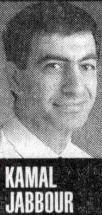

Run For Your Life
Running Across Cultures
Published July 3, 2000 in The Post-Standard.By Dr Kamal Jabbour, Contributing Writer
I was born a weakling. In any other species, my mother would have eaten me to preserve genetic integrity. Yet she was on a strict diet, so I spent my first summer traveling on the arms of my aunts. My underdeveloped legs had little chance of carrying my body. Medical science gave me little hope of ever walking.
I did eventually walk but retained my weakling status. At age 10, my older brother recommended karate classes to strengthen my body and spirit. The old Japanese martial art of "empty hands", the literal meaning of karate, gave me my first exposure to running.
Sensei Okamoto, our teacher, was a very wise man. He taught us that the best way to win a fight is to run away from it. So, in addition to two hours of kicking, punching, and body-contorting acrobatics every day, he took us running. "Run for your life," he shouted as he chased us around the school grounds, kicking the butt of anyone he caught. We ran barefoot in kimonos on grass and asphalt. We ran everywhere we went.
My Japanese indoctrination into running proved useful in my late teens. We lived one mile away from the American University of Beirut. The war of Lebanon and my college days started at the same time. My days would have been numbered, had it not been for Sensei Okamoto. I ran from home to school in the morning as sniper bullets struck around us. I ran back home in the evening as rocket explosions lit the sky. His voice rang in my head. "Run for your life."
During a lull in the fighting, I rode with my brother to bring food into our village. The back roads were fairly safe, except for an open river crossing. The routine was simple. Accelerate to full-speed before reaching the bridge, and pray that the snipers had a bad day. So, when the car stalled at the entrance of the bridge, it was another "run for your life."
After graduating with distinction but without puncture wounds, I flew to England for further education. The war of Lebanon quickly faded in comparison to life in the Pendleton district of Salford. With wild dogs outnumbering humans, and unemployment exceeding employment, Sensei's wise words were lifesavers.
Motorway M-1 separated the Pendleton from campus. A pedestrian overpass provided safe passage for the students. I lived half-a-mile from those stairs. So, every morning, I would make sure that the path was clear of dogs, and dash for those stairs, faster than Roger Bannister's last lap.
I immigrated to America, pledging never to run again. I took a comfortable job and lived one mile from my office. I installed a remote garage door opener, and drove to work in two minutes. I went home for lunch, and indulged in a daily nap. Seven years later, I earned tenure and swore allegiance to the flag. I bought a station wagon to fit my growing family and girth.
Comfort was short-lived. A routine physical revealed my excesses: excess weight, excess blood pressure, excess glucose and excess cholesterol. My physician advised me to exercise or die. "Run for your life" took on a new meaning. So I went running, one mile at a time, one day at a time, 11 years and counting.
As we celebrate our Independence and our diversity, and run in many "Fourth of July races," we rejoice in the knowledge that running transcends cultures and nations. For this runner has enjoyed the "run for your life" in Japanese, Lebanese, English and American.
Kamal Jabbour continues to "run for your life" at the sight of bumble bees. His RUNNING Column appears in The Post-Standard on Mondays. He maintains TrackMeets.com, the world leader in live track webcasting, and receives email at jabbour@syr.edu.
